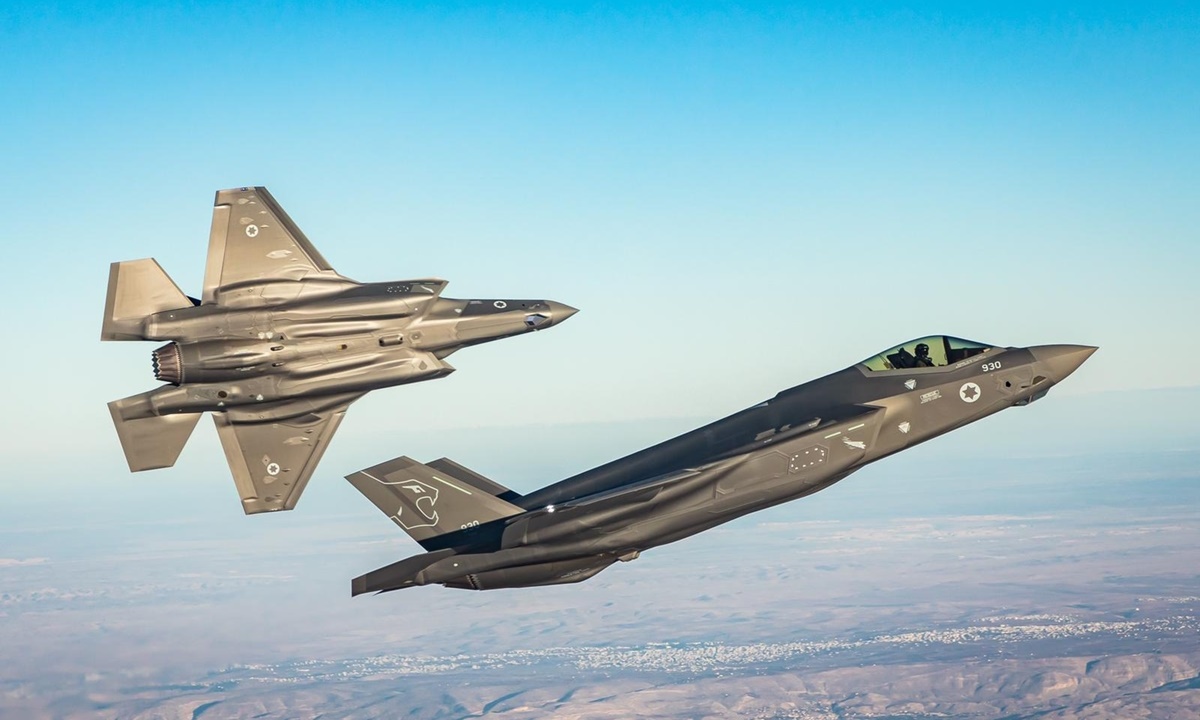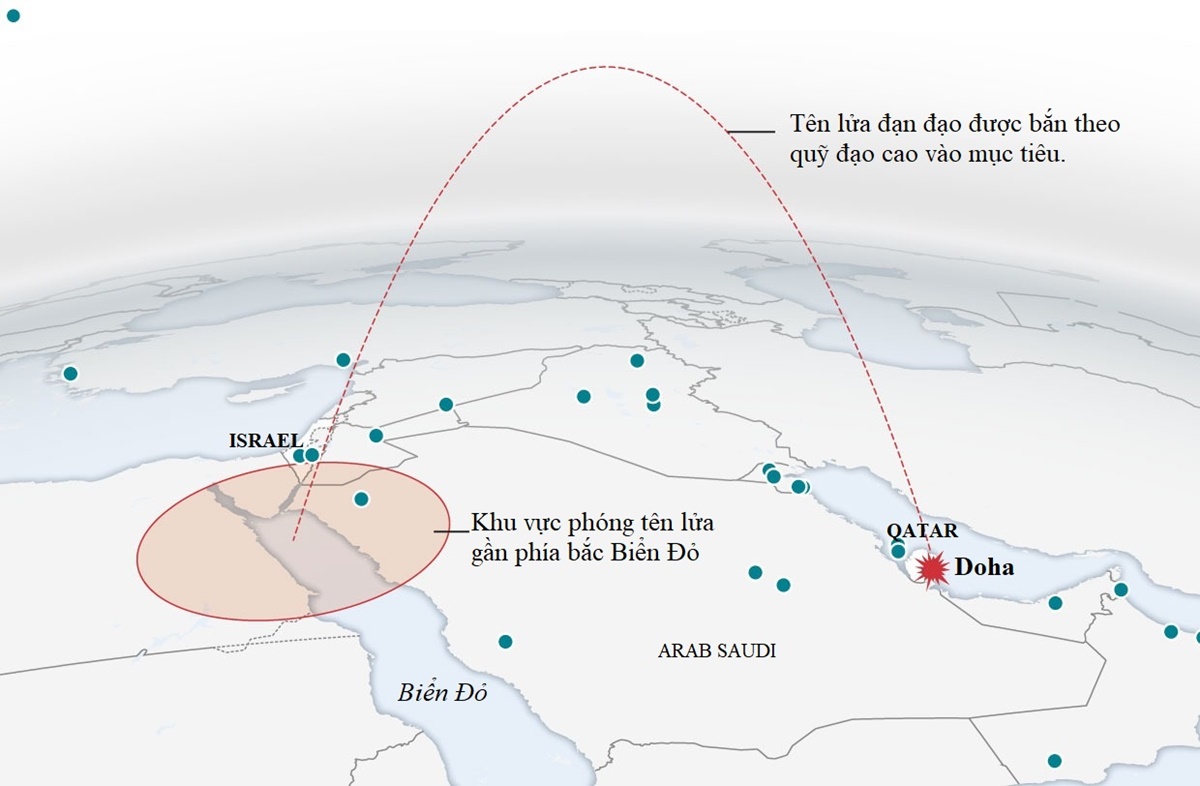When the Israel Defense Forces (IDF) and Israeli intelligence planned a clandestine strike against Hamas' political leadership in Qatar last week, they chose the quickest possible method, ensuring the US and its Arab allies in the region were completely caught off guard and unable to intervene.
Upon learning that top Hamas political leaders would meet in a downtown Doha building on 9/9, Israeli intelligence decided to launch an unprecedented strike into the "heart" of Qatar. However, this operation faced significant political and technical hurdles.
Targeting Hamas leaders in Doha required the IDF to strike within Qatar, a sovereign nation and close US ally. Using conventional bombs or missiles meant Israeli jets would have to fly over neighboring countries, including Saudi Arabia, which boasts a strong air defense system and has repeatedly opposed Tel Aviv's military actions in the Middle East.
IDF commanders opted to deploy fighter jets to launch long-range ballistic missiles from the Red Sea, avoiding Arab airspace. This tactic kept these nations, and even the Trump administration, unaware until the last minute.
 |
F-35 fighter jets from the Israeli Air Force's "Southern Lions" squadron fly over southern Israel in 1/2020. Photo: Times of Israel |
F-35 fighter jets from the Israeli Air Force's "Southern Lions" squadron fly over southern Israel in 1/2020. Photo: Times of Israel
8 F-15s and 4 F-35 stealth fighters flew to the Red Sea, opposite Qatar across Saudi Arabia. From there, some jets launched ballistic missiles on a high trajectory over Saudi Arabia, toward Doha, approximately 1,500 km away.
Israel hasn't disclosed the weapons used, but US intelligence documents leaked in 2024 revealed the IDF possesses fighter jet-launched ballistic missiles. Reports mention two types: "Golden Horizon" and the ISO2 system, or "Rocks," stationed at the Hatzerim Air Base in the Negev Desert with F-15s. These missiles' specifications remain undisclosed.
Interviews with senior US officials briefed on the operation shed light on the attack. They indicated Israel notified the US military just minutes before the launch. Initially, Israel didn't specify the target. However, US infrared tracking satellites captured the launch and trajectory, confirming Doha as the target. This left the Trump administration with insufficient time to intervene.
"The notification came so close to the actual launch that there was no way to reverse or stop it," a senior US defense official said, describing Israel's operation as "completely out of the box".
According to US officials, US Central Command (CENTCOM) informed General Dan Caine, Chairman of the Joint Chiefs of Staff, who then reported to the White House. President Trump instructed special envoy Steve Witkoff to immediately warn Qatar, but it was too late. Qatar confirmed receiving the warning 10 minutes after the missile struck Doha.
"Unilaterally striking Qatar, a sovereign nation and close US ally working diligently and bravely with us to mediate peace, doesn't serve the goals of either Israel or the US," Trump posted on Truth Social after the attack.
Observers note the strike highlights Israel's military superiority in the region and its capacity for long-range, high-precision strikes.
By launching ballistic missiles into space from the Red Sea instead of directly targeting Doha, Israel avoided accusations of violating Saudi airspace. Saudi officials later condemned the strike but didn't publicly mention the missiles' trajectory over their territory.
 |
Trajectory of Israeli missiles in the strike against Hamas leadership in Doha, Qatar, on 9/9. Graphic: WSJ |
Trajectory of Israeli missiles in the strike against Hamas leadership in Doha, Qatar, on 9/9. Graphic: WSJ
The missile hit the building's middle floors, damaging that area and the left side of the ground floor. However, the structure remained standing, with other sections largely unaffected, suggesting a precise strike with a small warhead.
However, Tel Aviv seemingly miscalculated. Hamas leaders had left the meeting room for prayer in another building, leaving behind the phone Israeli intelligence was tracking.
Arab officials familiar with the incident said Hamas leaders, including deputy leader Khalil Al-Hayya, survived. However, the missile killed Al-Hayya's son, 4 other individuals linked to the group, and a member of Qatari security forces.
Some Israeli officials later implicitly acknowledged the strike may not have eliminated all intended targets.
At last week's UN Security Council meeting in New York, Qatari Prime Minister Mohammed bin Abdulrahman al-Thani accused Israel of crossing "every line, every limit" with the strike. "How can we host Israeli representatives when they carry out such an attack?" he asked, referring to Qatar's mediation role in Hamas-Israel peace talks.
The Security Council condemned the 11/9 attack but didn't mention Israel in its unanimous 15-member statement.
US media reported Trump had a heated call with Israeli Prime Minister Benjamin Netanyahu on the day of the strike, expressing deep frustration over being blindsided. Officials said Trump considered the attack "unwise" and was angry he learned about it from the US military, not Israel.
Netanyahu explained he had a limited window of opportunity. In a less tense follow-up call, Trump asked about the strike's success; Netanyahu said he didn't know. Qatar hosts thousands of US troops, many at Al Udeid Air Base outside Doha, about 30 km from the targeted building.
The strike reportedly undermined years of Israeli diplomatic efforts with Gulf states and raised concerns about the US security umbrella for these oil powers.
People flee as Israel strikes Hamas targets in Doha, Qatar, on 9/9. Video: NY Post
"The strike damages Israel's reputation globally and in the Gulf, increasing the fear we've seen in Arab states about Israel's ambitions," said Ofer Guterman, a senior expert at the Institute for National Security Studies in Tel Aviv.
Arab leaders expressed outrage and planned to meet soon in Doha for a unified response. Israeli officials said they remain open to talks with Hamas about ending the Gaza fighting, but analysts believe the recent operation severely damaged Tel Aviv's position.
Some Middle Eastern officials say the attack could also hinder US efforts to build a regional air defense system with Israel and Arab states against Iran. At the time of the strike, US troops were conducting exercises in Egypt with Qatar, Saudi Arabia, and other regional partners.
Vu Hoang (According to WSJ, AFP, Reuters)












